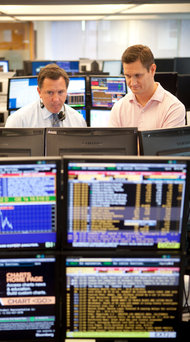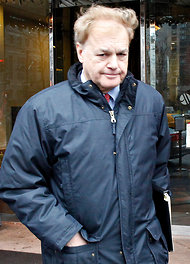 Michael Falco for The New York TimesMac Budd, left, and Rich Bryant watched markets on Bloomberg terminals for MF Global before the firm’s collapse. Bloomberg lost nearly $1 million a month in revenue when MF Global failed.
Michael Falco for The New York TimesMac Budd, left, and Rich Bryant watched markets on Bloomberg terminals for MF Global before the firm’s collapse. Bloomberg lost nearly $1 million a month in revenue when MF Global failed.
The collapse of MF Global has wreaked havoc on farmers, ranchers and other investors who were clients of the brokerage firm, prompting a loud outcry over the disappearance of $1.2 billion in customer cash.
But they are not the only ones to suffer. The financial information giant Bloomberg L.P. lost about 600 subscriptions to its computer terminals — which translates to nearly $1 million in monthly revenue — after MF Global filed for bankruptcy on Oct. 31. The sudden loss of business caused Bloomberg employees to miss their target sales by 12 percent in 2011, people briefed on the matter said, a shortfall that could take a toll on the firm’s bonuses.
While $1 million sounds like a rounding error for Bloomberg, which generates nearly $7 billion in revenue a year, the hit underscores the symbiotic relationship between Wall Street and Bloomberg.
The terminals, with their orange type on black screens that spew real-time market quotes, news and data ranging from sports scores and horoscopes to hedge fund holdings and credit-default swaps, are ubiquitous on Wall Street. Bloomberg, which competes with Reuters, FactSet Research System and News Corporation’s Dow Jones, has more than 314,000 terminal subscriptions worldwide. The income from those subscriptions accounts for about 85 percent of the company’s revenue; each terminal subscription costs about $20,000 a year.
That income stream has enabled Bloomberg — which is still controlled by its founder, Mayor Michael R. Bloomberg of New York — to pay for a huge global news operation of nearly 2,300 journalists who produce some 5,000 reports a day.
Given its reliance on subscriptions, Bloomberg is susceptible to turbulence on Wall Street. Terminal subscriptions first declined during the financial crisis. Lehman Brothers, which collapsed in September 2008, alone had about 3,500 subscriptions.
Yet the damage was ultimately tempered. Some Lehman employees started hedge funds, which required their own terminals. When Barclays bought Lehman’s American operations, the British bank expanded its terminal outlay to accommodate a wave of new employees.
MF Global was a dream client for Bloomberg. For a modest-size brokerage firm, it had a surprisingly large number of subscriptions, according to former employees. Of its 2,500 employees, nearly one-third had subscriptions. (MF Global still has about 200 subscriptions as it continues to use terminals in bankruptcy.)
Wall Street firms often provide machines for only their traders, bankers and investment executives. At MF Global, however, terminals were distributed more broadly — for instance, a human resources employee had one, according to a former employee who spoke on the condition of anonymity.
Such costly expenses were being reined in before the firm’s collapse. Bradley Abelow, the firm’s chief operating officer, had ordered that some terminals be returned, the former employee said.
The close financial ties between the two companies were reflected, at least initially, in bankruptcy court. Bloomberg Finance was listed as a creditor in MF Global’s first bankruptcy filing on Oct. 31, which said it was owed roughly $276,000 for an undisclosed reason. In MF Global’s most recent filing this month, however, the company is no longer listed as a creditor.
“We are still a creditor of MF Global,” a representative for Bloomberg said Thursday, adding that she did not know why the company was omitted.
“Bloomberg had a good year in terms of sales of our core terminal product in a difficult market,” she said, adding that subscriptions over all rose by 14,000.
Bloomberg is not the only one touched by the bankruptcy of MF Global. Others that did business with the firm, as well as Wall Street lobbying firms and trade groups, like the Securities Industry and Financial Markets Association, that received regular fees, have been affected.
But those losses pale in comparison to many MF Global customers, who are out an estimated $1.2 billion that was supposed to be protected. As MF Global began to spiral downward, the firm raided client funds to meet its own obligations.
The Commodity Futures Trading Commission is leading the investigation into MF Global, while the Federal Bureau of Investigation and the United States attorney’s offices in New York and Chicago are exploring potential criminal wrongdoing.
Two months after it was found to be missing, no customer money has been recovered, though investigators have tracked where some of it went. About $200 million was transferred to JPMorgan Chase on the last business day before MF Global filed for bankruptcy, according to people close to the investigation. In addition, as the company was unwinding its balance sheet, customer money was funneled through a clearinghouse, the Depository Trust and Clearing Corporation, the people said.
 Mark Lennihan/Associated PressJames Giddens, the court-appointed trustee for MF Global.
Mark Lennihan/Associated PressJames Giddens, the court-appointed trustee for MF Global.
The delay has outraged customers, some of whom need the cash to help make ends meet.
On Thursday, the trustee overseeing the return of customer money held a meeting to address the concerns of MF Global clients. More than 100 people were at the downtown Manhattan Marriott to hear about the state of the investigation from the trustee, James W. Giddens.
Mr. Giddens stressed that the inquiry was complex and meant combing through more than 100 terabytes of data — or the equivalent of 950 miles of pages stacked together.
But the clients seemed unimpressed. “It was a waste of time coming here,” Eric Brown, a broker affiliated with MF Global, said after the meeting.
Others looking for the trustee to take action against JPMorgan and Jon S. Corzine, MF Global’s former chief executive who was also the governor of New Jersey, found little satisfaction from the meeting. “Customers haven’t been made whole, and they’re in the toilet,” said one customer, Peter Suarez. “This is a joke.”
Michael J. de la Merced contributed reporting.
Article source: http://feeds.nytimes.com/click.phdo?i=7cf8b4016f028815bbb7aecb5d84f874